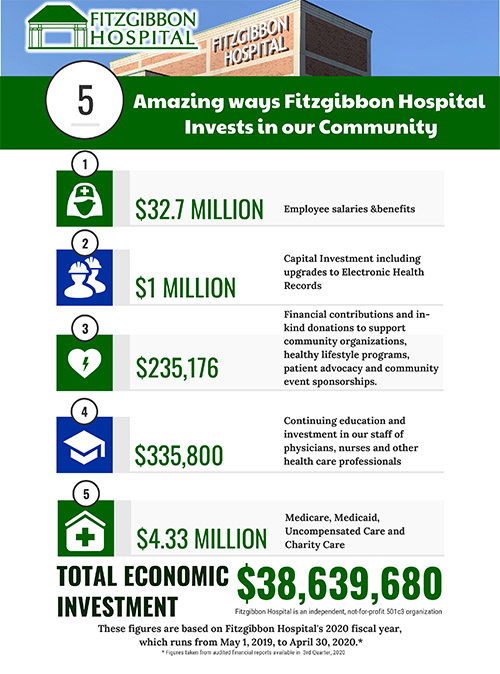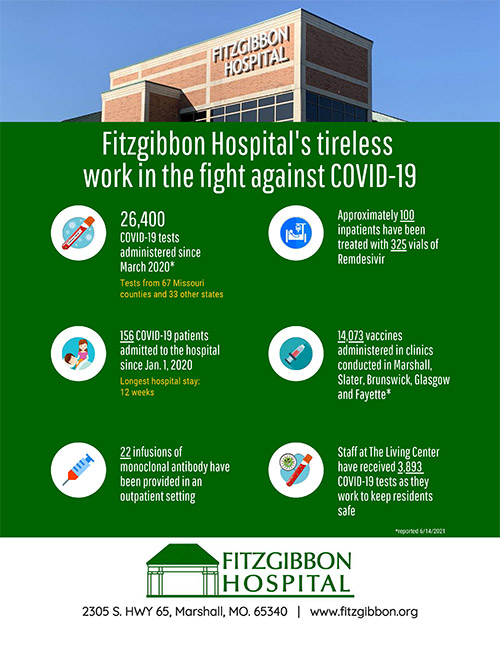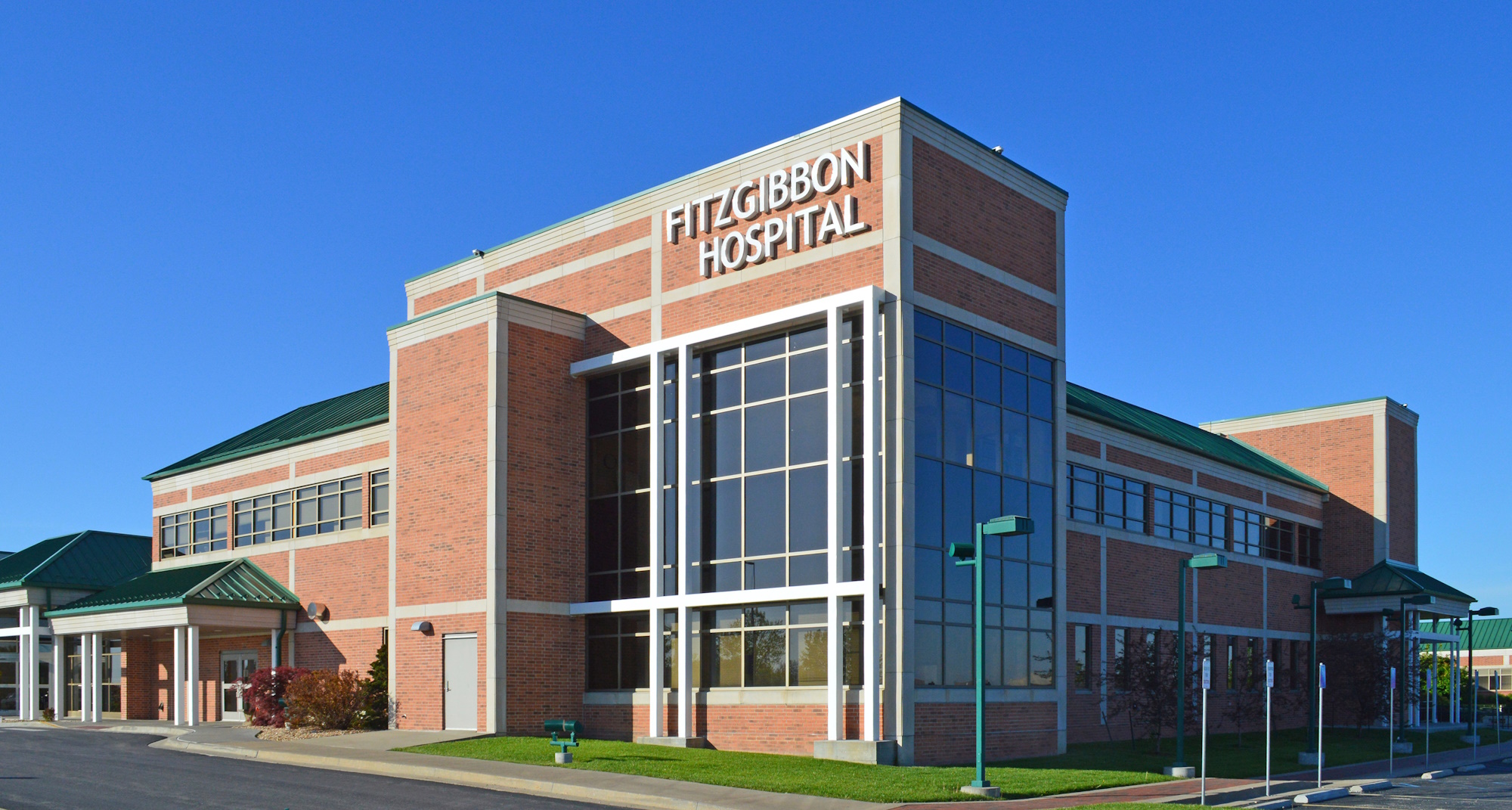Fitzgibbon Hospital is a Vital Economic Engine for Saline County, even through the Covid-19 Pandemic
June 17, 2021

Many aspects of a community add to its quality of life, but few variables are as important as reliable job opportunities with a company concerned about its employees and the health of the area. For Fitzgibbon Hospital, which recently released its fiscal year 2020 Community Investment Report, these factors are equally important.
As one of the largest employers in the area, Fitzgibbon Hospital provides jobs to 480 full- and part-time employees, generating an annual payroll of more than $32.7 million, which is invested back into the local economies of Marshall, Saline County and the surrounding area. When adding in uncompensated care totals, capital investments, donations to other community organizations and investments in health professionals’ continuing education, the total community investment figure for FY2020 is more than $38.6 million.
“We have made a significant investment in not only our employees but also in the communities we serve,” said Fitzgibbon Hospital’s Chief Executive Officer Angy Littrell, CPA, MBA. “And though these figures are for the fiscal year ending in May 2020, it’s important for the community to know that even during the pandemic, when other businesses closed, and some hospitals furloughed employees, we did everything possible to retain our payroll and staff in the midst of fighting a deadly virus. This was a conscious decision for us to do the right thing for these area families to continue to pay their rent, their mortgages, their bills and re-invest into local, struggling economies, allowing them all to buy groceries and feed their families. We also provide healthcare services to all, regardless of whether they are uninsured or under-insured.”
The Fitzgibbon 501(c)3 organization is comprised not only of the not-for-profit acute care hospital, which operates a 24-hour emergency department, delivers babies and staffs all the “typical” hospital services, such as surgery, laboratory and therapy, but it also operates a cancer center, five physician clinics in the communities of Marshall, Slater, Brunswick and Fayette, and a long-term care facility, The Living Center, on the hospital campus. All services are operated on a not-for-profit basis. Any revenues – which come only from the services it provides - are invested back into its facilities, its personnel or donated to other community organizations.
Fitzgibbon is independent, not part of a larger system, or a hospital “district” and receives no financial support from a tax levy.
“In the early days of Covid-19, when very little was known, many health care providers rolled up their welcome mats and closed their doors – mostly out of fear. Instead, our nurses donned protective gear and risked their own health and safety at a time when there were few treatments and so many were frightened. They conducted round-the-clock curbside testing and treated patients in our Emergency Room,” said Littrell.

“It took a lot of grit and personal fortitude for our front-line workers to do what they did during those early weeks and months of the Covid-19 pandemic,” Littrell added. “I am hopeful our entire community understands the impact all that testing had on keeping our businesses open and helping our processing plants stay operational. In fact, in a two-day period last April we conducted 493 car-side tests at the request of one of our major employers.”
As part of compiling its annual look-back of economic investment, Fitzgibbon also released figures regarding the year of Covid-19 and reports administering more than 26,400 Covid-19 tests since March of 2020. These tests were conducted on people from 67 Missouri counties and 33 other states. They also administered more than 14,000 Covid-19 immunizations to the communities of Marshall, Slater, Brunswick, Glasgow and Fayette, most in collaboration with Missouri Valley College in Marshall and some with assistance from area county health departments or other entities.
Its annual Community Investment Report also shows that it provided more than $4.3 million in “uncompensated care.” This figure represents the shortfall from Medicare and Medicaid reimbursements and forgiveness of almost $442,000 in “charity care” provided to the neediest in the community who are unable to pay.
The hospital also donated $235,176 to community organizations whose activities support the hospital’s mission of improving the health and quality of life for all. This includes the cost of placing a Certified Athletic Trainer within the Marshall Public School District as part of a collaborative effort to help ensure the safety of student athletes.
The hospital also provides free athlete physicals in area schools to ensure that any student who wishes to play a sport and engage in healthy activities is not prohibited by the cost of obtaining the required physical exam. Additionally, they support of the Missouri Valley College Nursing Program, which is located on the campus of Fitzgibbon Hospital.
Among the many and varied organizations Fitzgibbon Hospital supports through financial donations are the Salt Fork YMCA, the Marshall Philharmonic Orchestra, the OATS Transportation Service, the Marshall High School DECA program, the United Way, the Missouri Valley College Rodeo program, the Saline County Fair Association, the Marshall Booster Club, area Optimist, Lion’s and Rotary clubs and the American Cancer Society's Relay for Life. These and dozens of other schools and organizations have benefited directly from Fitzgibbon Hospital's commitment to improve the health, quality of life and education for Saline and surrounding counties.
To read the FY2020 Community Investment Report in its entirety, please go to www.fitzgibbon.org/about-us/community-investment.
For additional information about this release, contact Amy Weber, Business Development Director, at 660-831-3204.


